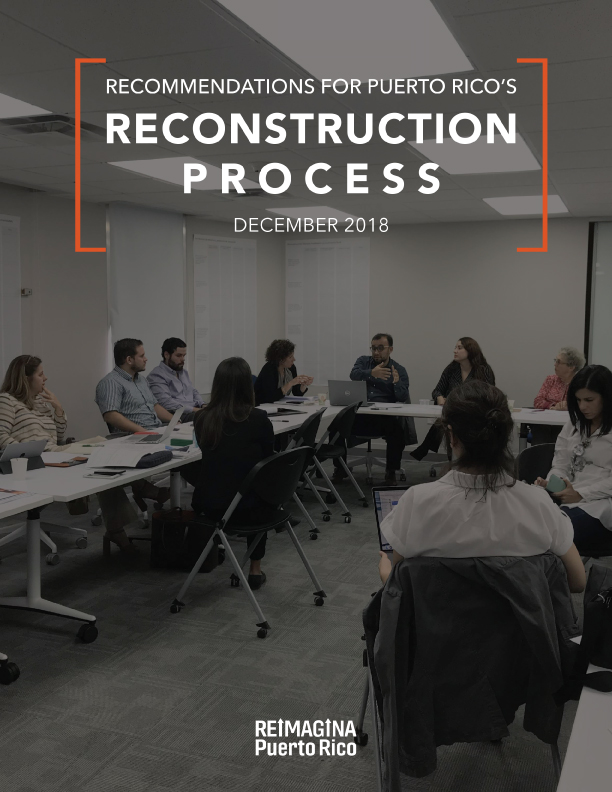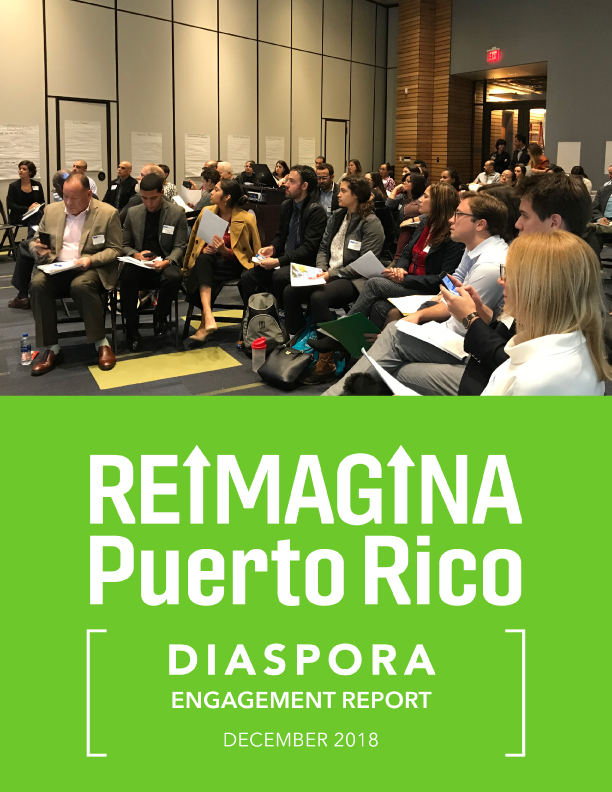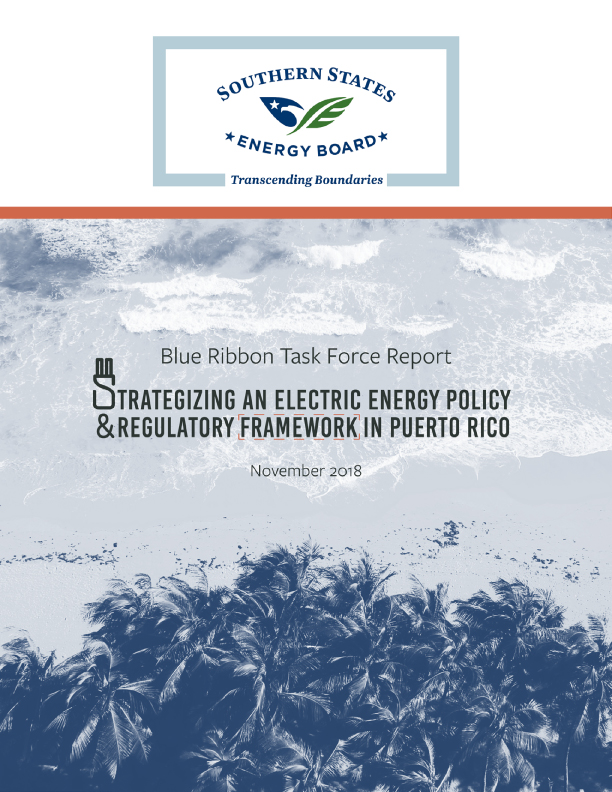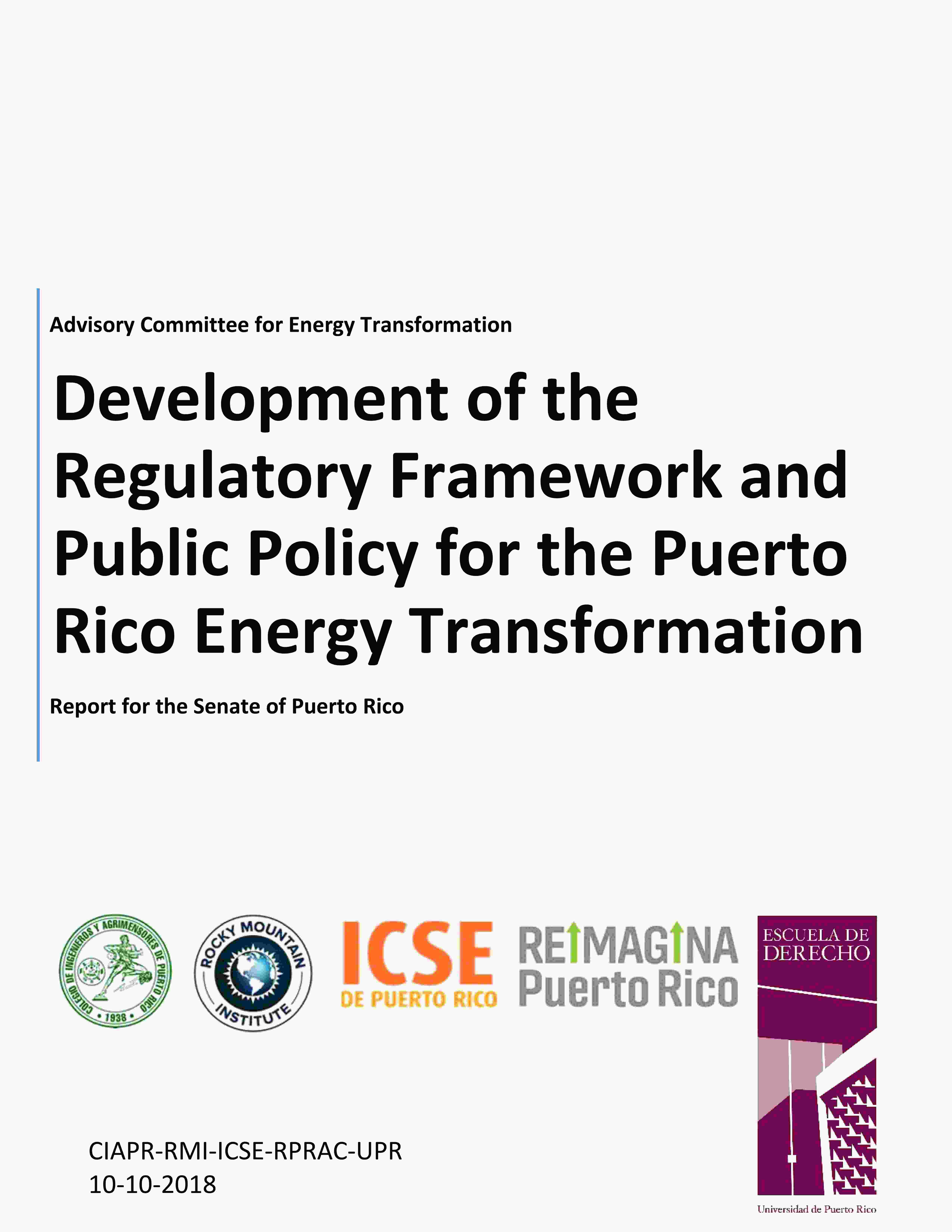
Fostering a Better and Stronger Puerto Rico for all
ReImagina Puerto Rico is a locally-led nonprofit initiative that works toward a coordinated reconstruction to rebuild a stronger, fairer, and more prosperous Puerto Rico. ReImagina seeks to tap the variety of approaches, visions, and experiences that communities, private entities, NGOs, and public institutions can bring forth in a coordinated effort to rebuild a stronger, fairer, more prosperous Puerto Rico.
ReImagina was created in January 2018, in the aftermath of Hurricanes Irma and Maria and the throes of Puerto Rico’s fiscal and economic crisis. Non-partisan and independent, ReImagina evolved from the Resilient Puerto Rico Advisory Commission and is currently a program of the Center for a New Economy.
Recognizing that beyond the enormous physical, social, and economic challenges that Puerto Rico faces today, there is a wide horizon of opportunities to transform the island following common priorities and promoting a fair reconstruction process, ReImagina identified the need to go beyond pre-existing conditions and seek to promote innovation, ingenuity, and a learning-by-doing approach in all rebuilding and reconstruction initiatives.
As a first step towards creating a common blueprint and maximizing the use of recovery funds invested in the island, ReImagina convened a wide variety of voices to identify a broad but common focus for rebuilding efforts. 77 dialogue sessions with 748 stakeholders identified 6 cross-cutting strategies and 97 actionable recommendations, 17 of which were identified as immediate priorities. These have been published in the ReImagina Puerto Rico Report and Six Sector Reports.
Keep scrolling for a look at ReImagina’s Reconstruction Toolkit and additional information on the Resilient Puerto Rico Advisory Commission.
Reconstruction Toolkit
ReImagina Sector Reports
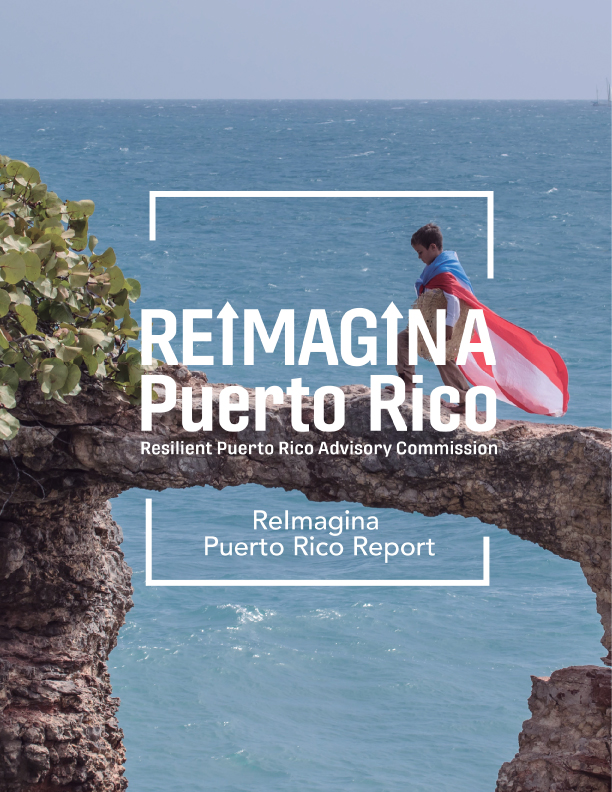
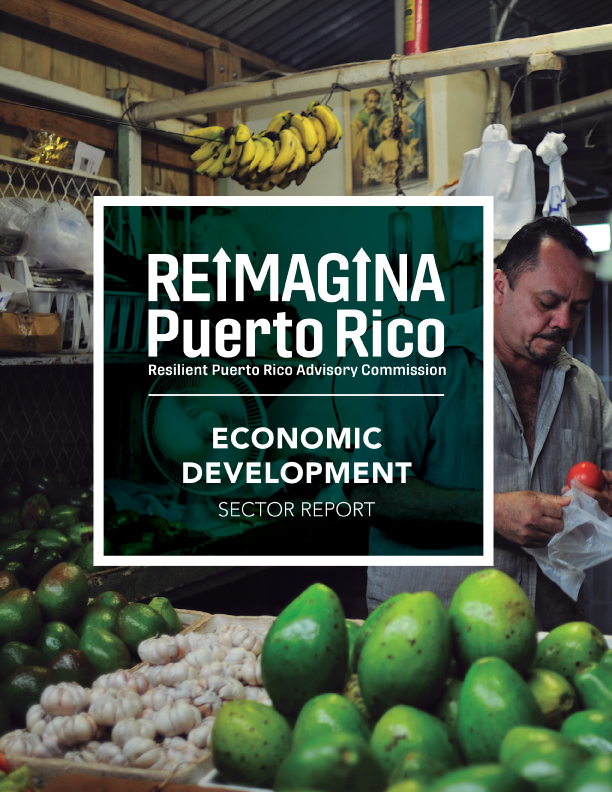
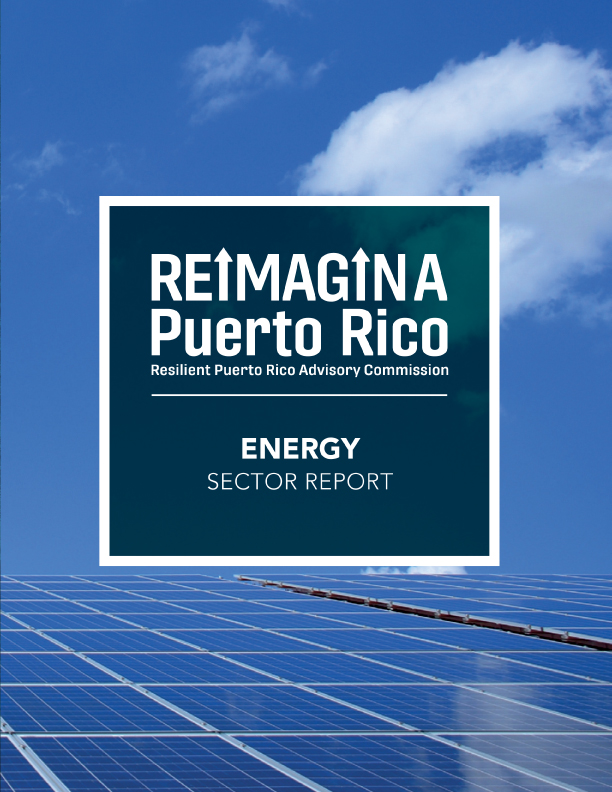
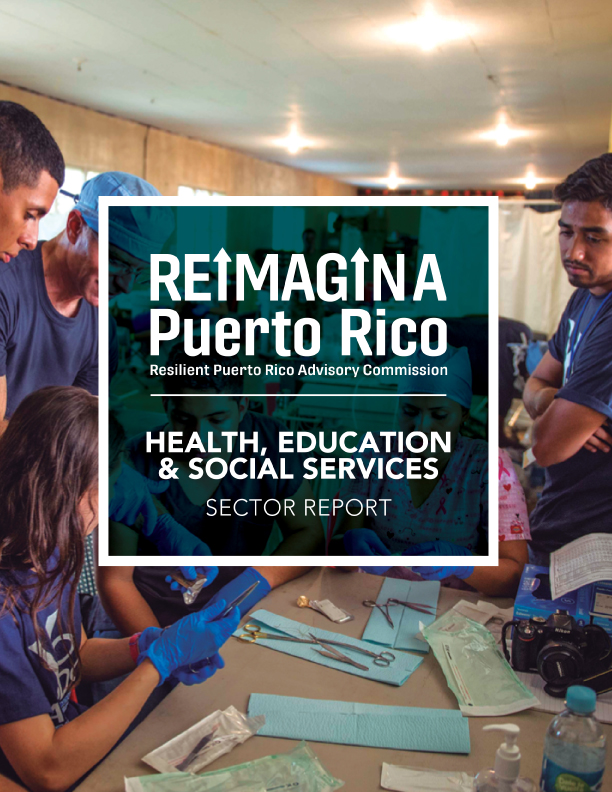
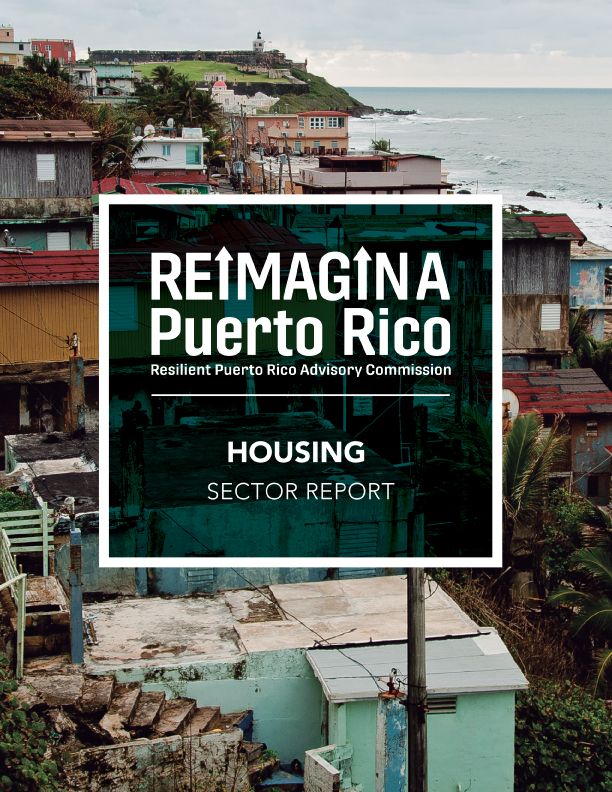
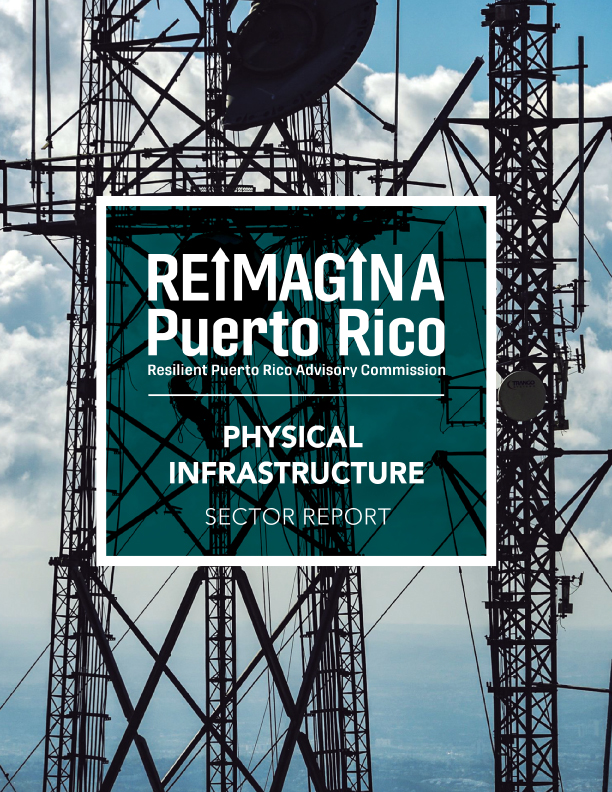

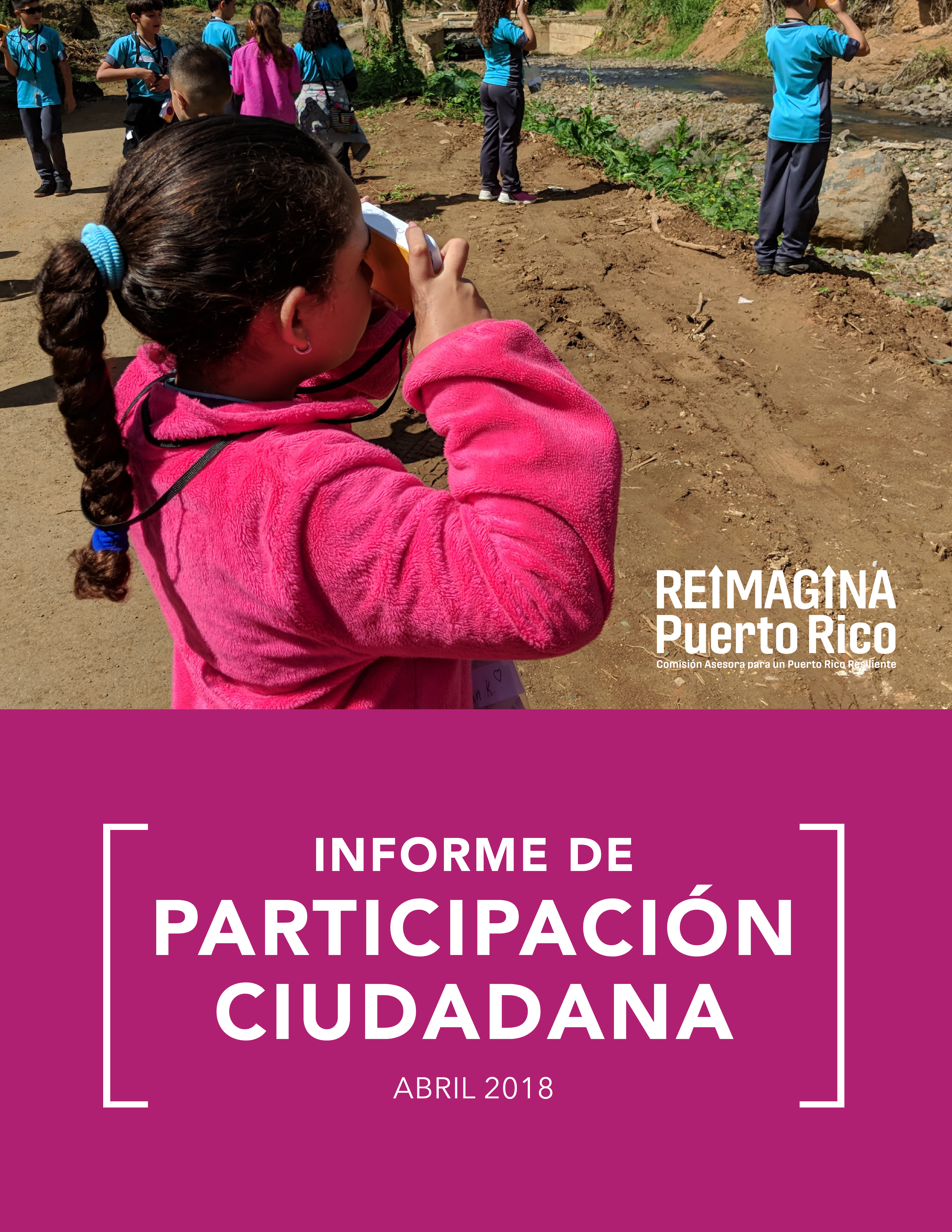
Tools & Resources

ReImagina collaborated with Habitat for Humanity International, Puerto Rico Builders Association and Enterprise Community Partners to develop a digitally-accessible and printed guide on how to mitigate the impact of hurricanes and increase the resilience in the island’s housing. The guide was developed so that professionals from the construction industry and the general public can understand it. The guide is only available in Spanish.
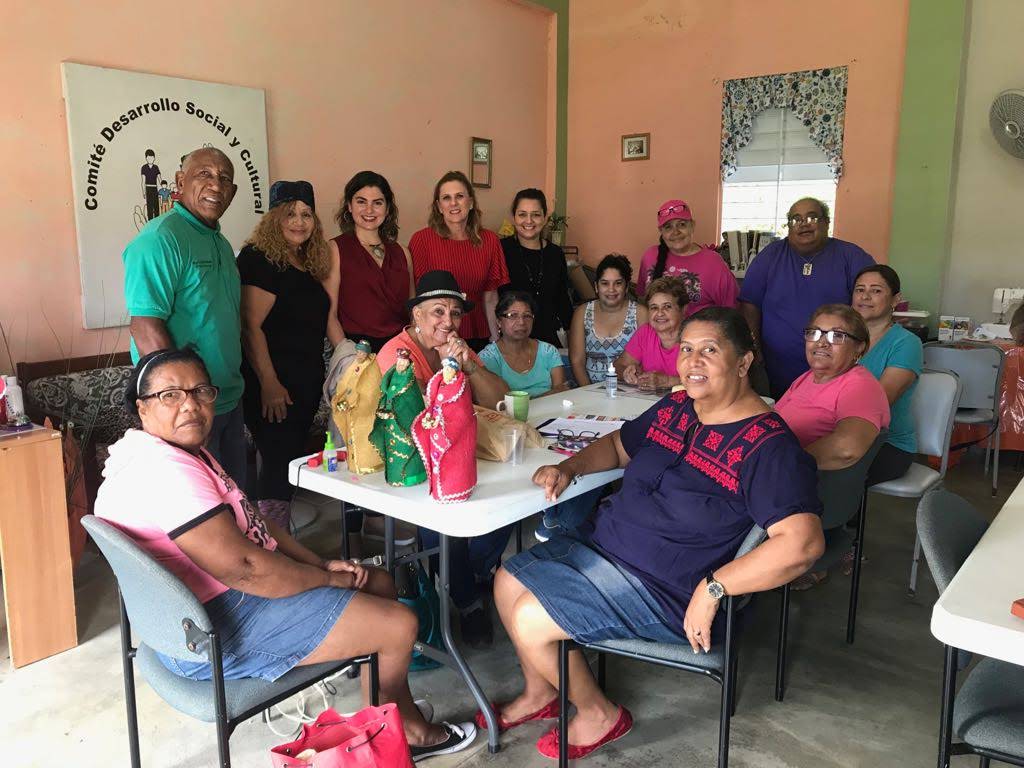
Created in collaboration with Resilient See, Mercy Corps, and Enterprise Community Partners, this guide will help communities in the process of identifying strategies to create resilient assets, spaces and systems that will allow continuous operations during emergencies. This guide is directed to community leaders and was published in October 2019.

A digital directory of construction industry resources created with the collaboration of the Puerto Rico Builders Association, the Associated General Contractors of Puerto Rico, and the Mechanical Contractors Association of Puerto Rico. The directory is a platform where local companies and professionals can publicize services related to the reconstruction of Puerto Rico. This is key for local involvement in recovery efforts as approximately 90% of reconstruction and recovery-related contracts have been awarded to outside U.S. firms. The directory was launched in November 2019.
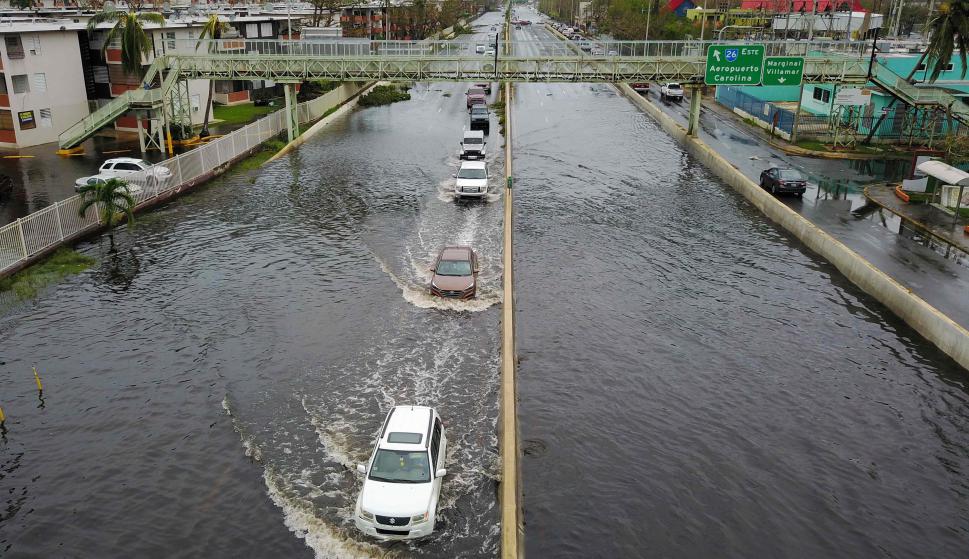
These seminars aimed to identify the needs, experiences and opportunities at the municipal level in order to develop an island-wide integrated stormwater management program. Created in collaboration with FEMA, EPA, the Puerto Rico Water and Environment Association (PRW&EA), and PR government agencies, they will target municipal planning and public works offices. The seminars were offered in June of 2019 in Caguas, Mayagüez, Ponce, and Arecibo.
The Resilient Puerto Rico Advisory Commission
ReImagina Puerto Rico evolved from the Resilient Puerto Rico Advisory Commission, a nonprofit, independent and inclusive body led by Puerto Ricans and supported by Ford Foundation, Open Society Foundations, and The Rockefeller Foundation. The Commission, created in November 2017, concluded its efforts in 2018 after publishing the ReImagina Reports.
The Commission aimed to reimagine a stronger, more resilient Puerto Rico; promote a participatory and transparent reconstruction process; and sought to produce an actionable and timely set of recommendations for how to use philanthropic, local government, and federal recovery funds.
Essential in the effort was for the people of Puerto Rico to take an active role in forging the future vision of the island. The process combined two primary conceptual frameworks to guide the process of reimagining Puerto Rico’s recovery and reconstruction: FEMA’s National Disaster Recovery Framework and The Rockefeller Foundation’s City Resilience Framework. Consequently, the Commission divided its work into six sectors:

Energy

Physical Infrastructure

Natural Infrastructure

Health, Education & Social Services

Housing

Economic Development
Community members and leaders, grassroots organizations, business leaders, government officials, and representatives from professional organizations were convened in a wide outreach process that culminated in the ReImagina reports.

Click each heading below for more information
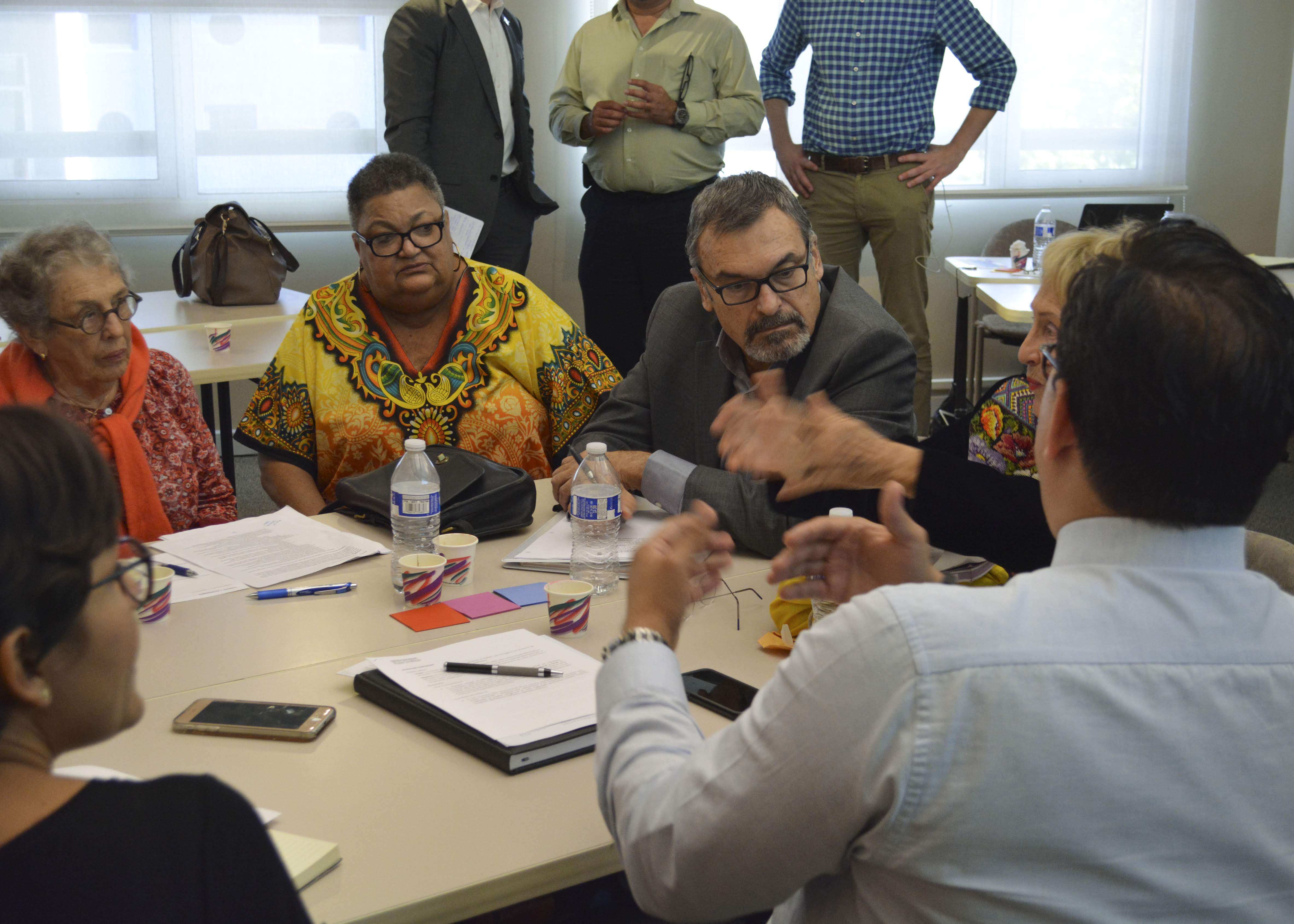

Sector-focused Working Groups
Sector-focused Working Groups facilitated technical discussions through which stakeholders identified goals, objectives and actions focused on resiliency.

Community Outreach & Engagement
Community Outreach & Engagement Activities were held in six distinct regions of the island that were strategically selected to represent all areas of Puerto Rico, including the urban/rural divide and other geographical, social, cultural, and regional characteristics.
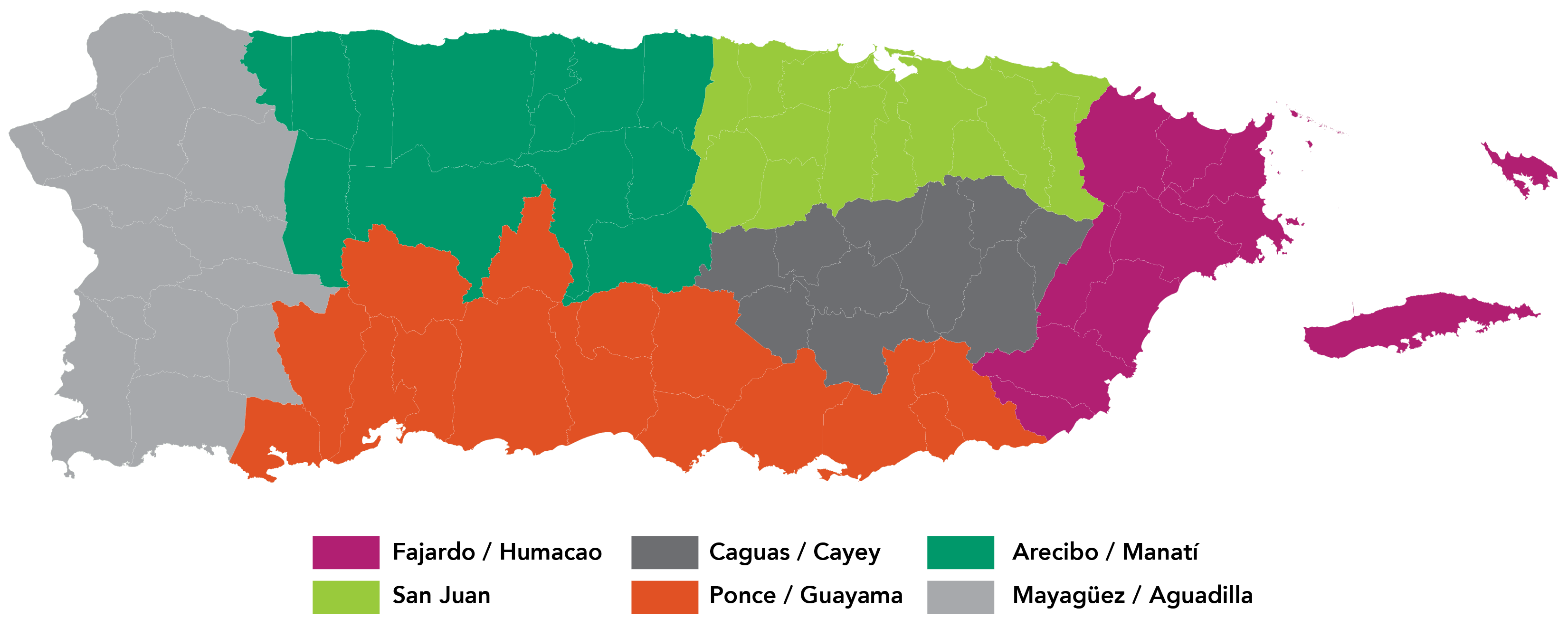
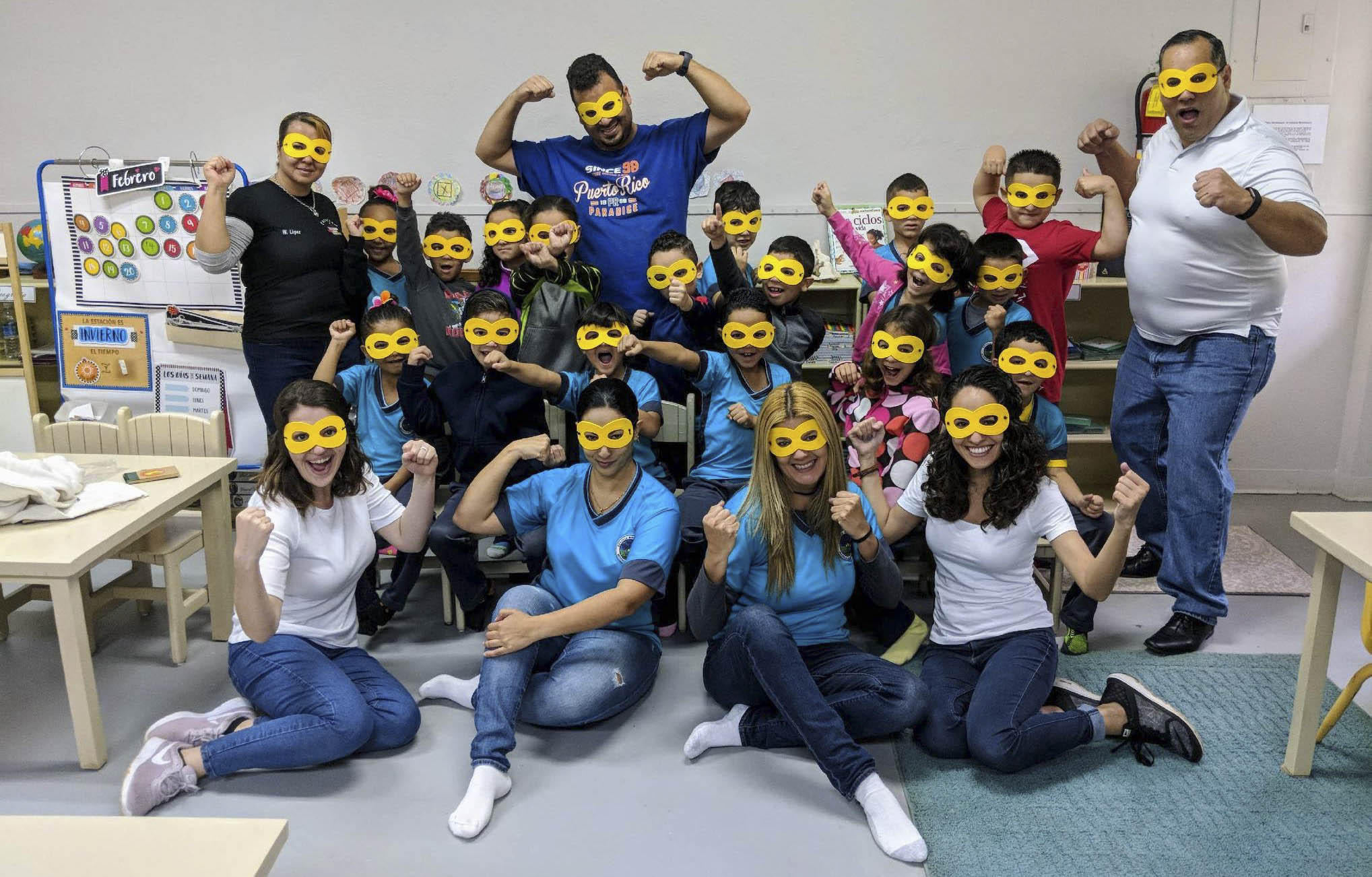
Youth Participatory Photography
360 students from six schools across the island were asked to identify, through photography, important recovery challenges in their communities.
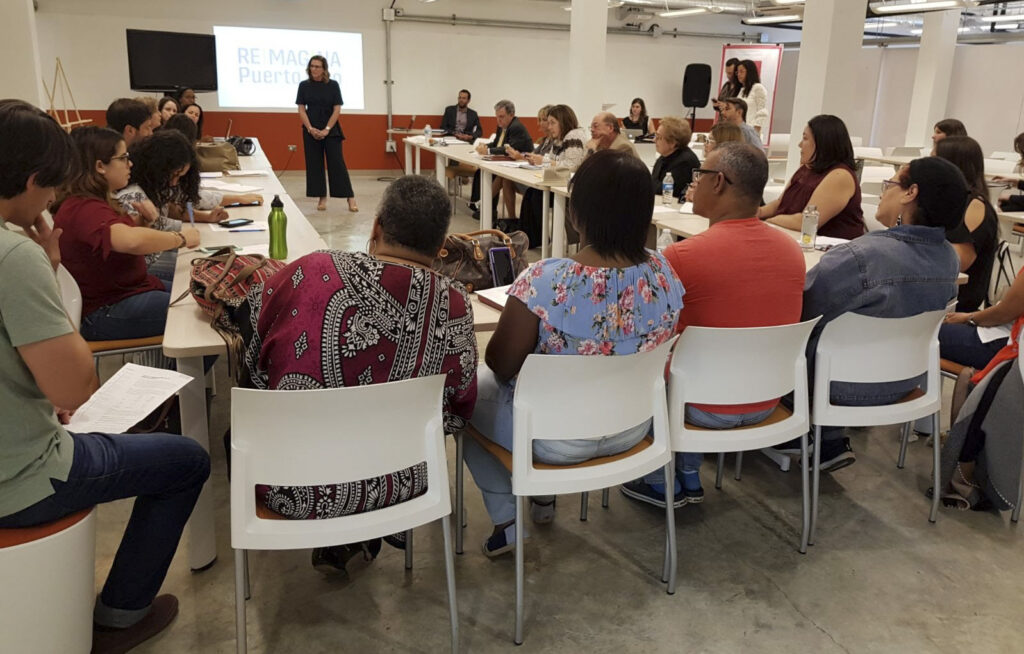
Community Focus Groups
15 focus groups were held among the six regions of Puerto Rico, NGOs, the diaspora in central Florida, and journalists.

Public Sector Advisory Group
Two sets of meetings were held with high-level officials from key government of Puerto Rico agencies, as well as mayors from rural and urban municipalities representing the island’s main political parties.
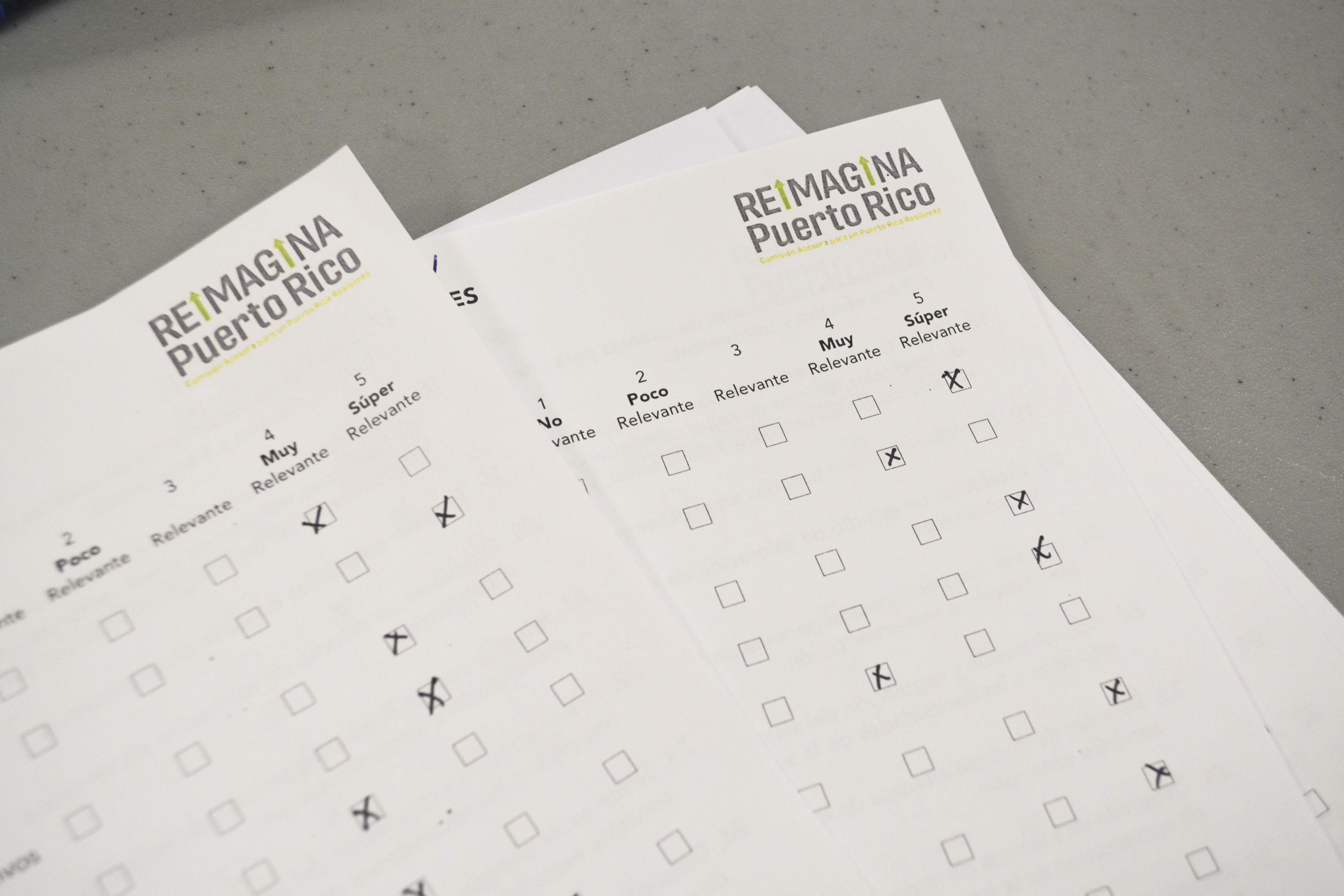
ReImagina presented the results of this ample participatory process to a wide array of stakeholders in Puerto Rico, New York, Washington D.C., Connecticut and Massachusetts.
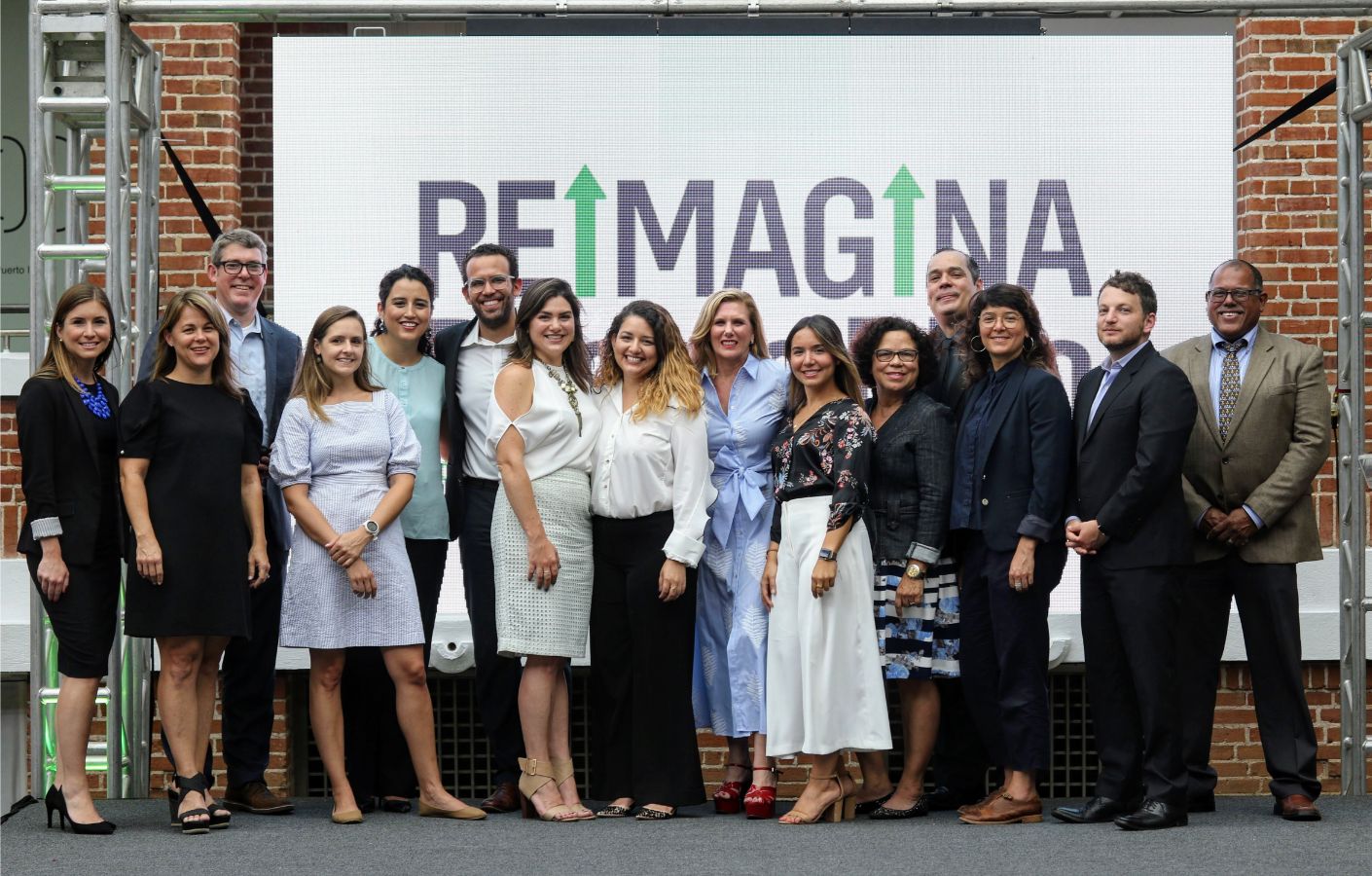
At a Press Conference and a Project Presentation ReImagina presented the ReImagina Reports, which include 97 recommendations for the reconstruction of a resilient Puerto Rico.
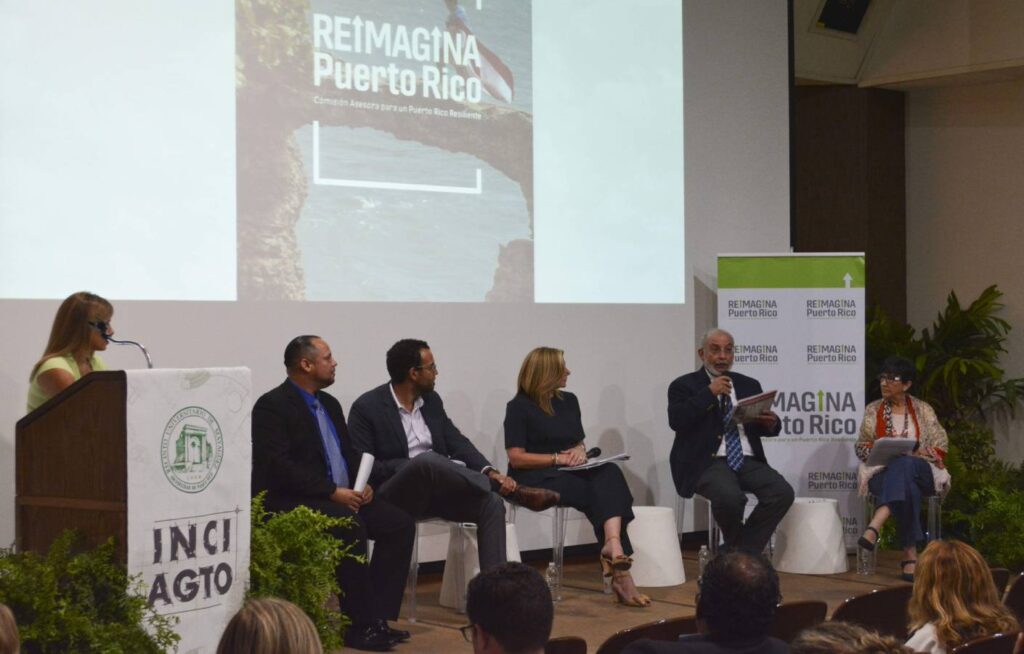
Town Hall Meetings were held in five regions across the island to present the results to the general public.
The Commission, supported by various local organizations, led Town Hall Meetings in five regions across the Island during June and August 2018. During these meetings, the Commission presented ReImagina Puerto Rico’s efforts and the priority recommendations in the Report. The Commission also thanked communities for their involvement and presented ways in which the communities can get more involved in the reconstruction process efforts. These meetings took place in the following manner:
- San Juan at Universidad Sagrado Corazón on June 26, 2018
- Mayagüez at UPR Mayagüez on August 14, 2018
- Ponce at Universidad Interamericana, Recinto Ponce on August 16, 2018
- Humacao at UPR Humacao on August 21, 2018
- Cayey at UPR Cayey on August 23, 2018
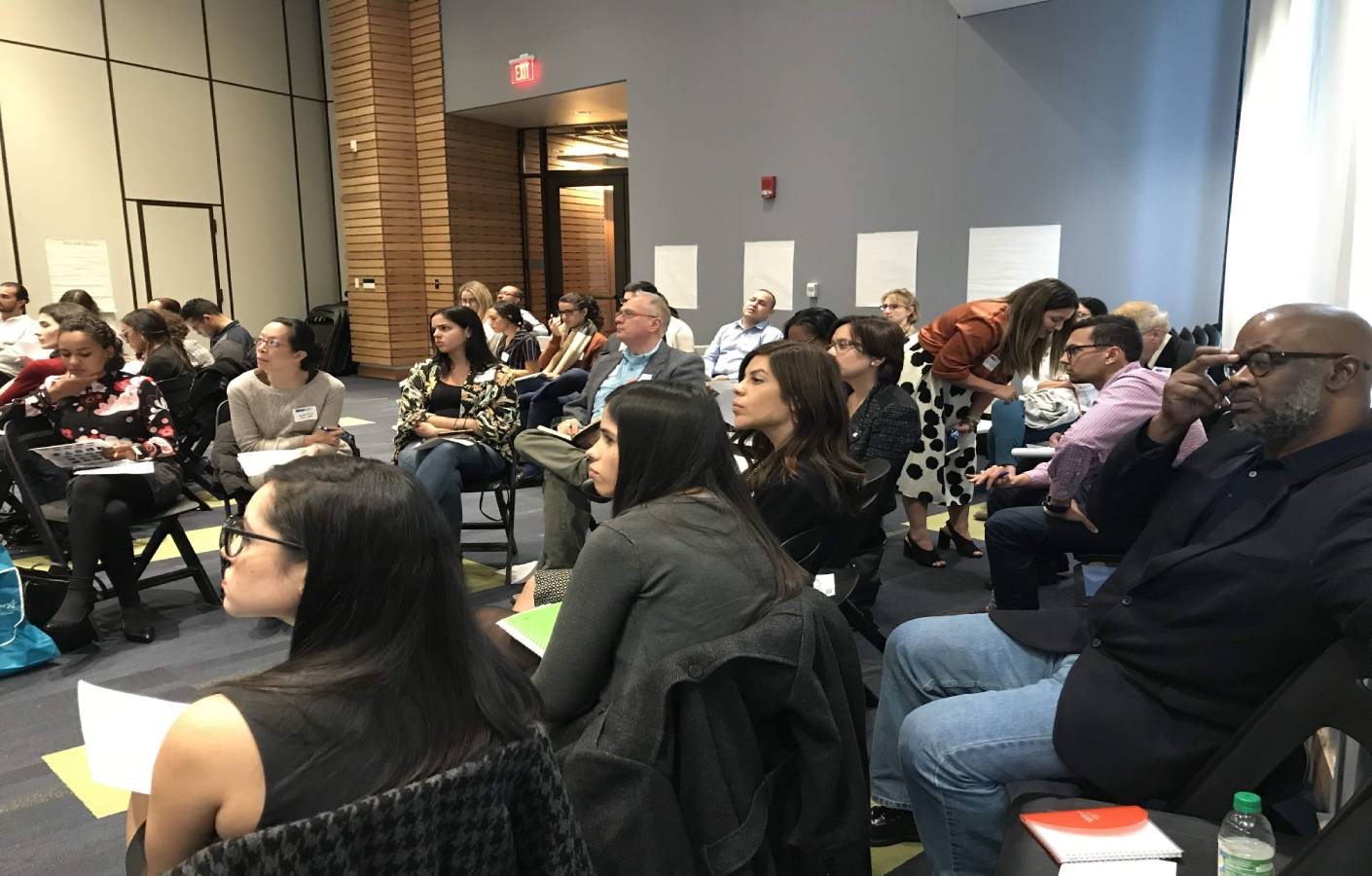
Presentations to the Diaspora were held in Hartford, CT, Holyoke, MA and Boston, MA, and at the Puerto Rican Diaspora Summit in Washington, D.C.
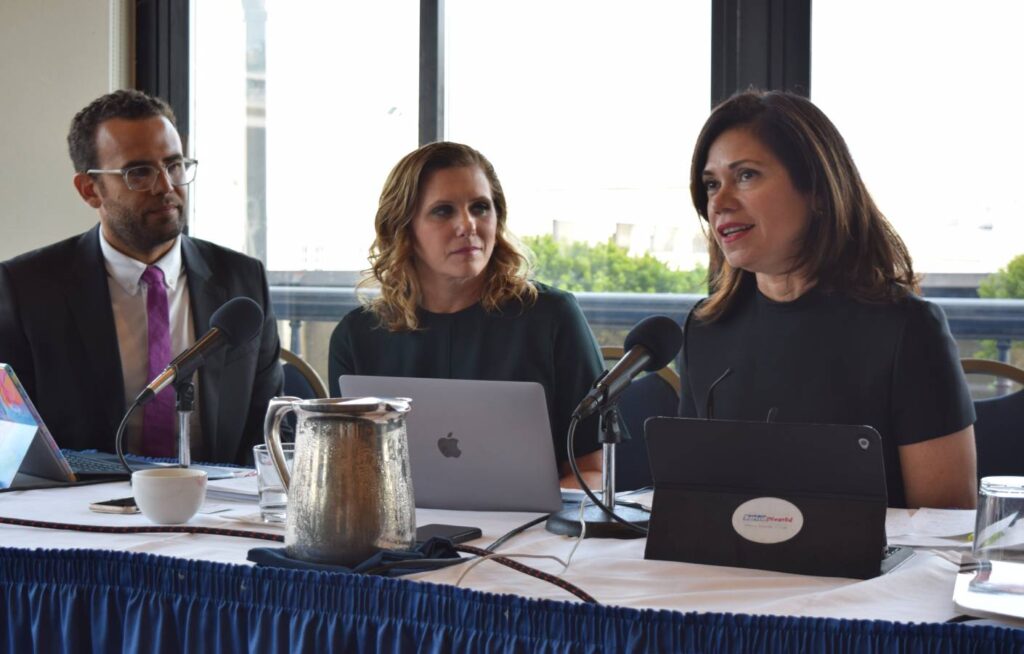
The ReImagina Reports were presented to local and federal government officials, congressional staff, and senators in NY and in Washington, D.C.
Following the publication of the ReImagina Puerto Rico Report, ReImagina presented the project in Washington, D.C. with the main objectives of (1) promoting the project throughout Congress and federal agencies responsible for the reconstruction of Puerto Rico, and (2) establishing ReImagina as a viable resource in Puerto Rico. The ReImagina team briefed reporters, congressional staff, federal agency personnel, and Senators on the report’s 97 specific recommendations. While in Washington, D.C. ReImagina met with federal officials at the Office of Management and Budget, the Department of Housing and Urban Development, the Federal Communications Commission (FCC), and the congressional offices of Congresswoman Nydia Velazquez (NY-7), Resident Commissioner Jennifer Gonzalez (PR), Senator Dick Durbin (IL), Senator Marco Rubio (FL), Senator Bob Menéndez (NJ), Senator Susan Collins (ME), Senator Lisa Murkowski (AK) and Senator Bill Nelson (FL). Shortly afterward, ReImagina also presented the project at a convening in New York for philanthropy and organizations interested in the recovery work taking place in Puerto Rico.
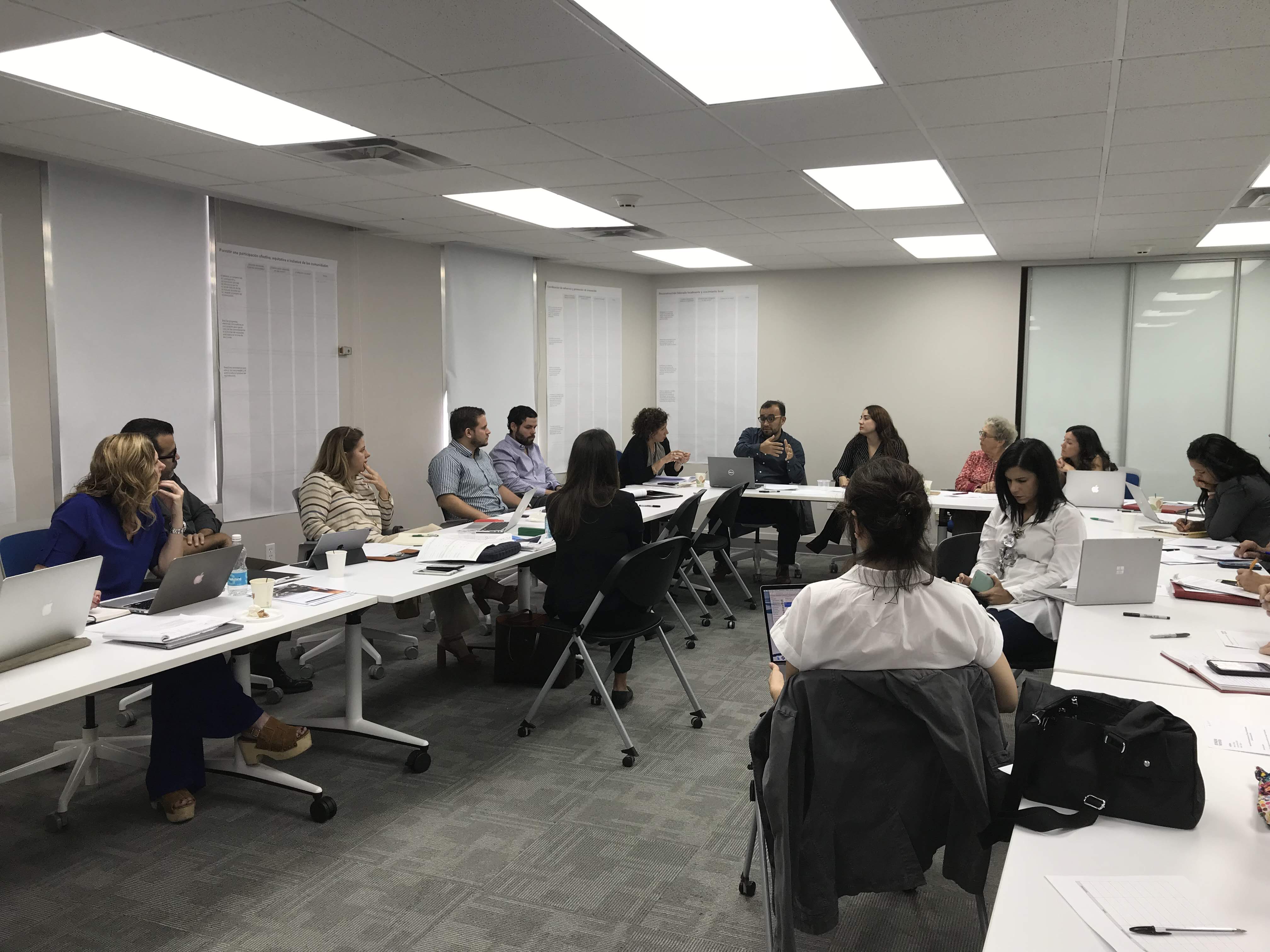

Reconstruction Process Working Group
A Reconstruction Implementation Process Working Group composed of representatives from the private sector and NGOs with experience, knowledge and diverse backgrounds developed Specific Recommendations for the Reconstruction Process of Puerto Rico, a guide for government entities making decisions on the reconstruction of Puerto Rico. The guide was developed particularly to help the Central Office of Recovery, Reconstruction and Resilience (COR3) and the Puerto Rico Department of Housing focus on key reforms.
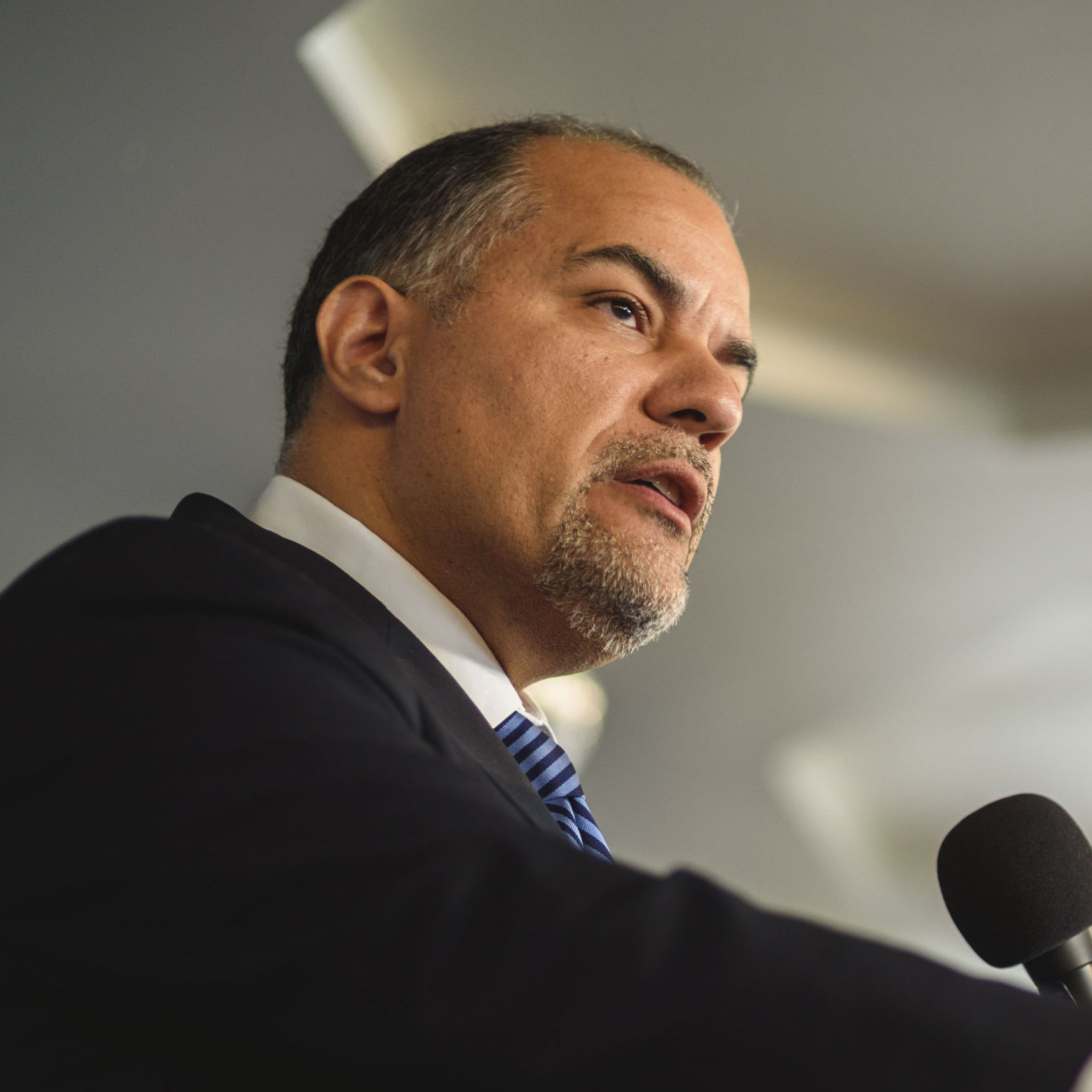
Miguel A. Soto-Class
President & Founder, Center for a New Economy
Mike Soto founded the Center for a New Economy (CNE) in 1998, and since then, has steered CNE into becoming one of the most credible and influential voices in Puerto Rico. Since 2014, CNE has been recognized as one of the Top Think-Tanks to Watch by the Global Think Tank Report of the University of Pennsylvania.
Mike has served as member of the Community Innovator’s Lab at MIT in Boston, Massachusetts, and the YouthSave Advisory Board at the New America Foundation in Washington, D.C. In 2008, he was selected as an Aspen Institute Ideas Fellow.
Mike was an editor of The Economy of Puerto Rico: Restoring Growth, published by the Brookings Institution in 2006 and selected, that same year, as a Notable Book by the American Library Association. He has been a columnist for El Nuevo Día, Puerto Rico’s largest daily circulation, since 2003, and was the host of a weekly news radio program on economics for several years.
He is currently the Yale Alumni Schools Director for Puerto Rico and the Virgin Islands. He is also a member of the Board of Directors of the Baldwin School of Puerto Rico, an Emeritus Member of the Advisory Council for the Conservation Trust of Puerto Rico, and the Chairman of Espacios Abiertos, an organization dedicated to growing civic capacity and promoting transparency in Puerto Rico.
Mike has a B.A. from Yale University and a Juris Doctor from Vanderbilt University.
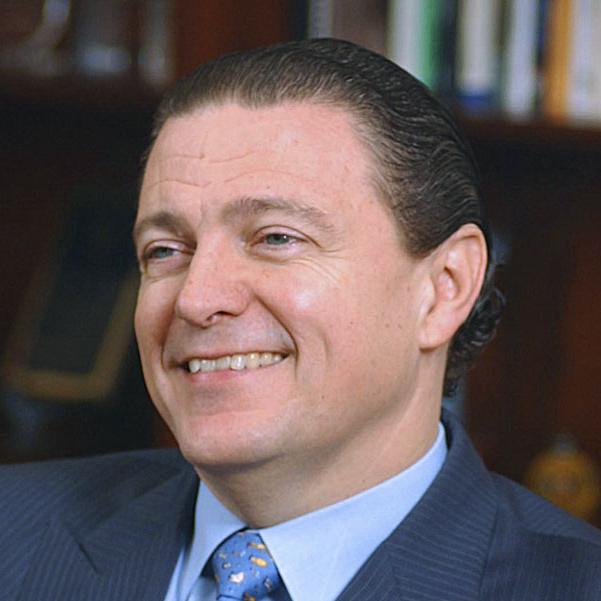
Richard L. Carrión
Executive Chairman, Popular, Inc.
Richard L. Carrión is the Executive Chairman of the Board of Directors of Popular, Inc., a publicly traded (BPOP) financial holding company. Banco Popular, a wholly owned subsidiary of Popular, Inc., is Puerto Rico’s leading depository institution. Mr. Carrión served as Popular’s Chief Executive Officer and Chairman of the Board from 1991 to 2017.
After obtaining a Bachelor’s Degree from the Wharton School of Finance at the University of Pennsylvania and receiving a Master’s Degree in Information Services from the Massachusetts Institute of Technology (MIT), Mr. Carrión joined Banco Popular in 1976.
In the information technology arena, Mr. Carrión’s vision brought the first network of ATMs to Puerto Rico and many other Latin American countries, and also spearheaded the successful migration from paper to electronic transactions.
Mr. Carrión sits on the Board of Directors of Verizon Communications since 1995, where he is a member of the Human Resources and Corporate Governance and Policy Committees, and is Chairman of the Finance Committee. He also served as class A director of the Federal Reserve Bank of New York from 2008 through 2015.
Mr. Carrión’s enthusiasm and energy in professional matters is coupled with a deep sense of social justice. He has been a member of the International Olympic Committee (IOC) since 1990, where he chaired the Finance Commission and the Audit Committee from 2002 until 2013. He was a member of the IOC Executive Board from 2004 until 2012.
He is a founding member and trustee of the Banco Popular Foundation.
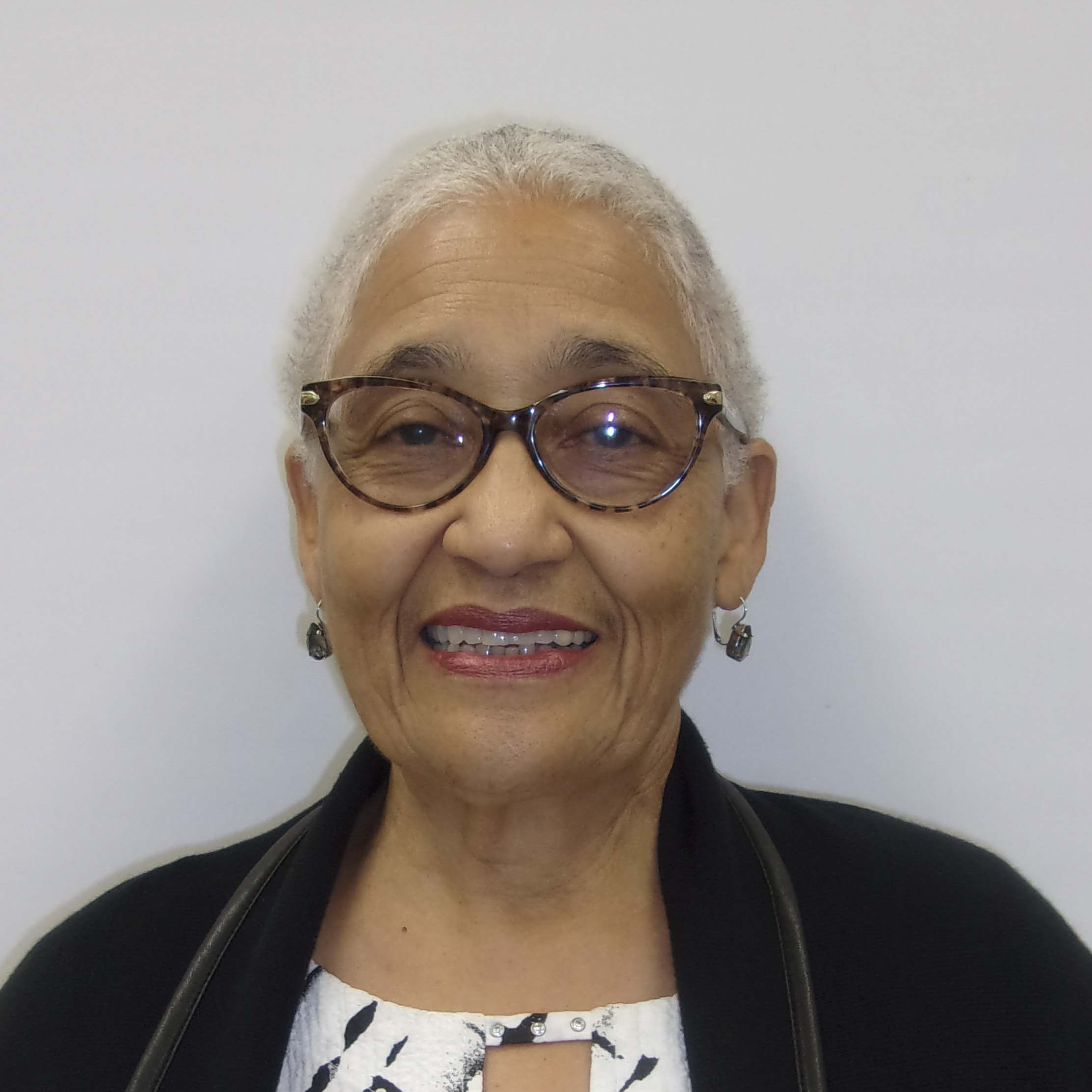
Dr. Carmen Milagros Concepción Rodríguez
Director, Graduate School of Planning, UPR
Carmen Milagros Concepción is professor and director of the Graduate School of Planning at the University of Puerto Rico, Río Piedras campus. She completed a Ph.D. in City and Regional Planning and a post-doctorate in Environmental Policy at the University of California, Berkeley. She holds a Master in Planning and a B.S. in Physics from the University of Puerto Rico.
Her research has focused on environmental policy and regulation, socio-environmental movements and organizations, institutions, and governance, topics on which she has published in academic and professional journals in Puerto Rico and abroad. She recently co-edited (with Gustavo García-López and Alejandro Torres-Abreu) the book manuscript entitled Environment and Democracy: Experiences of Community-Based Environmental Management in Puerto Rico, which has been accepted for publication by the University of Puerto Rico Press.
Dr. Concepción was director of the Social Sciences Research Center of the University of Puerto Rico from 2006 until 2009. Before becoming a faculty member of the Graduate School of Planning, she taught at San Diego State University and at the New School for Social Research.
Dr. Concepción also has a professional trajectory in public service. Before beginning her doctoral studies, she held positions as a planner, researcher, and consultant in various agencies and entities of the Government of Puerto Rico, including the Municipality of San Juan, the Puerto Rico Planning Board, the Puerto Rico Energy Office, the Right to Employment Administration, the Commission on Educational Reform, and the House of Representatives. She also worked for the Planning Office of the Puerto Rico Legal Services Corporation.

Federico (Friedel) Stubbe
Chairman, Prisa Group
Mr. Stubbe is a Chairman of the Prisa Group of Companies, developers of Green Resort Residential Communities and hotels in Puerto Rico. An award-winning developer of planned communities, he is an understated yet confident visionary. Stubbe is one of Puerto Rico’s largest developer-builders of residential, master-planned communities with over $100 million in annual sales and more than 800 employees.
He graduated from Georgia Institute of Technology with a Bachelor Degree in Civil Engineering and obtained a PMD (Program for Management Development) from Harvard Business School. He is an actual Governor of the Urban Land Institute and past Chairman of the Board of Directors of Península de Cantera Project (a government and private non-profit initiative to re-develop the largest remaining slum in San Juan), past President of the Puerto Rico chapter of the National Association of Homebuilders, member of the Georgia Tech College of Engineering Advisory Board, past Board Member of National Fish and Wildlife Foundation, Chairman of the Board of Herencia (a nonprofit environmental foundation), and Chairman of the Tasis Foundation (a K-12 educational institution).
Stubbe personifies the modern-day entrepreneur whose concern for the environment has turned into a mission. “As developers, we are nothing more than an instrument of the people of Puerto Rico to help create a better society.”
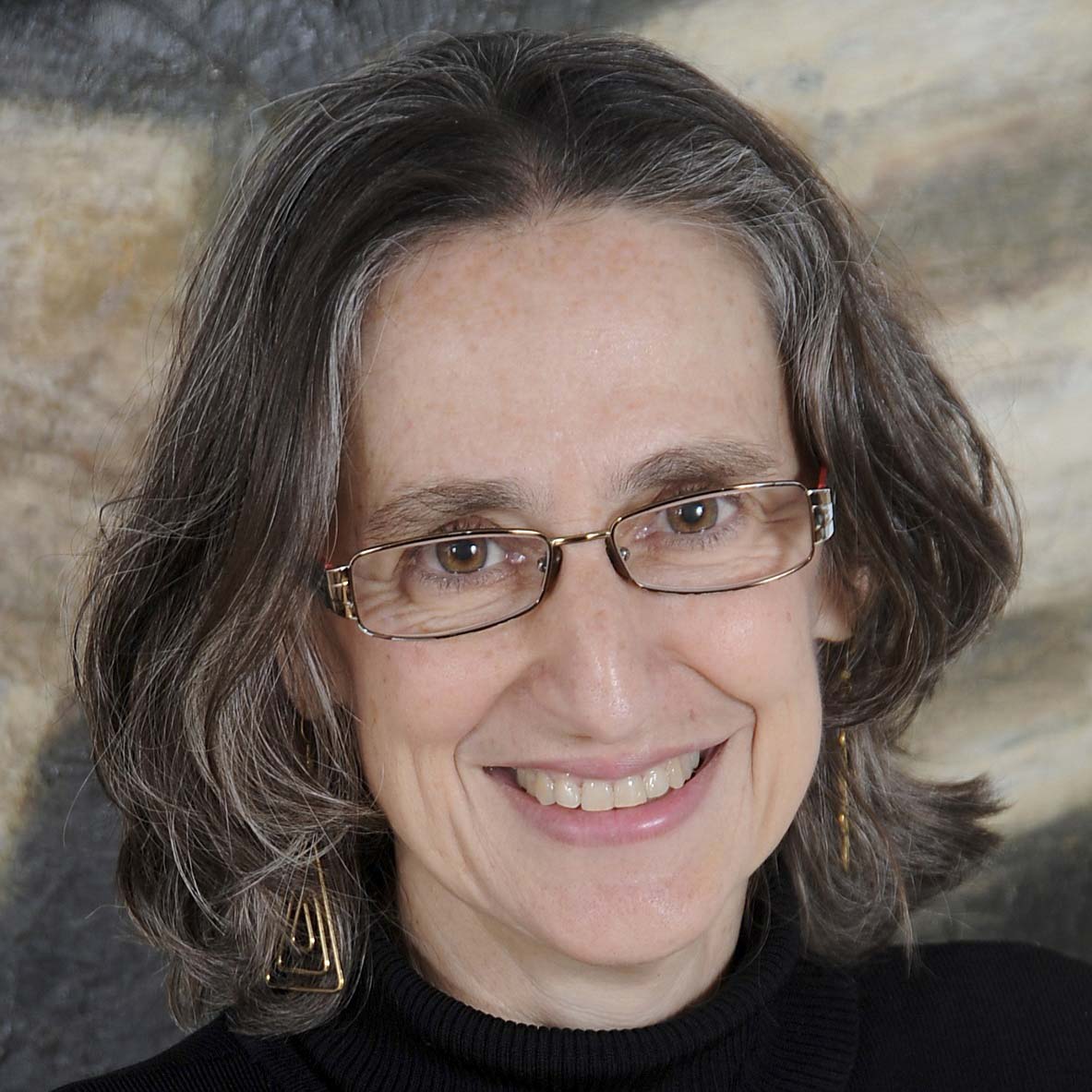
Dr. Ana María García Blanco
Executive Director, Instituto Nueva Escuela
Dr. García Blanco directs Instituto Nueva Escuela, a training center for Montessori teachers. She is also a professor at the Department of Education of Universidad del Sagrado Corazón in Santurce.
In 2013, she was appointed by the Governor of Puerto Rico, Alejandro García Padilla, as a member of the UPR Governing Board for a term of five years. As part of the Governing Board, Dr. García Blanco is a member of the Academic, Research and Student Affairs, and Development Committees.
Dr. Ana María García Blanco holds a Ph.D. in Philosophy in Education from Harvard University, where she also completed her Bachelor’s and Master’s Degree in Education. Her doctoral thesis was an ethnographic study of a community school in the Juan Domingo neighborhood in Guaynabo, Puerto Rico.
Dr. García Blanco worked as director of La Nueva Escuela Juan Ponce de León in Guaynabo for 21 years. Using an innovative approach and the Montessori method, she managed to reduce violence in the school and increase the academic performance of students. The school became a pilot school, the first to use the Montessori system in Puerto Rico.
She is the author of several education publications. Among them is the book Protagonistas en la comunidad, Texto Escolar para Segundo Grado de la Editorial Norma. She also collaborated in the articles “The Participation of Parents”, “The Education of the Youth”, and “The Collective Work of the Teachers” of the “Tertulias de Aquí” section of the Diálogo newspaper.
Daniel Colón Ramos, Founder of Ciencia PR
Enrique Ortiz de Montellano, President and CEO of Claro Puerto Rico
Félix Aponte Ortiz, Environmental Planner and retired Professor of UPR Graduate School of Planning
Fernando Lloveras, Executive Director of Para la Naturaleza
Gualberto Rodríguez III, President of Caribbean Produce Exchange
Irwin Redlener, Director of National Center for Disaster Preparedness
Janice Petrovich, Executive Director and Vice President of Red de Fundaciones de Puerto Rico
Jonathan Marvel, Principal of Marvel Architects
José “Pepe” Carlo, Professor of Medicine at UPR Medical Sciences Campus
José Luis Cruz, President of Lehman College
José Rodríguez Baéz, President of Puerto Rico Workers Federation (AFL-CIO)
Josen Rossi, Director of Instituto de Competitividad y Sostenibilidad Económica
Kathryn Wylde, President of New York City Partnership
Lucy Crespo, CEO of Puerto Rico Science, Technology & Research Trust
Luis A. Avilés Vera, Professor of Public Health at UPR Medical Sciences Campus
María Enchautegui, Chair of Economics Department of UPR Río Piedras
María Eugenia Ferré Rangel, President of Grupo Ferré Rangel
Nelson Reyes del Valle, Founder of Modelo de Incubadora de Microempresas Comunitarias Solidarias
Rafael L. Bras, Provost and Executive Vice President of Academic Affairs of Georgia Institute of Technology
Ricardo Álvarez-Díaz, Principal of Álvarez-Díaz & Villalon
Rosibel Recondo, School Director of Luis Lloréns Torres School
Samuel Abrams, Director of National Center for the Study of Privatization in Education at Teachers College, Columbia University
Resilient Power Puerto Rico
Taller de Planificación Social
Instituto Nueva Escuela (INE)
Asociación de Residentes Gladiolas Renace
Habitat for Humanity
RAND Corporation
Sociedad Puertorriqueña de Planificación
Estudios Técnicos Inc.
Asociación de Constructores de PR
Corporación ENLACE del Caño Martín Peña

